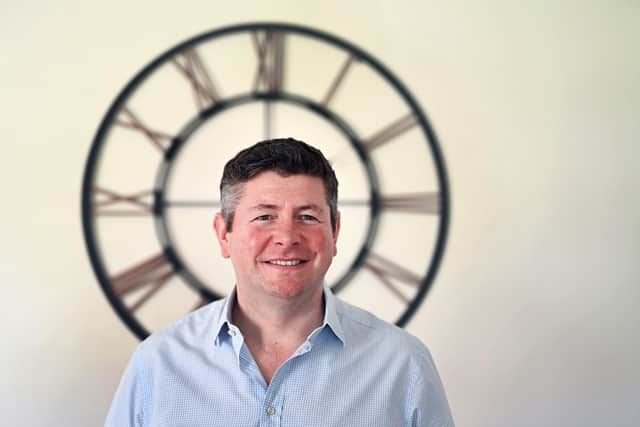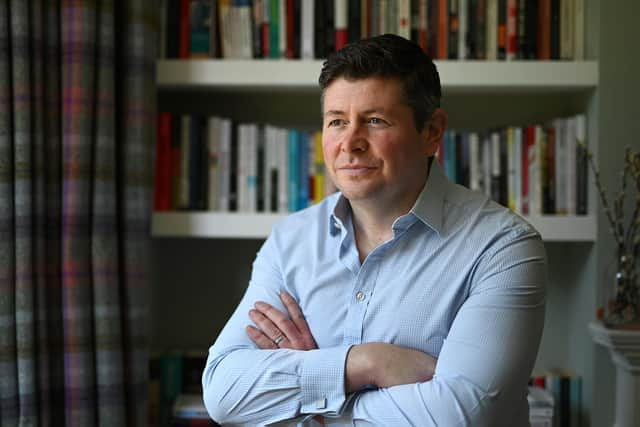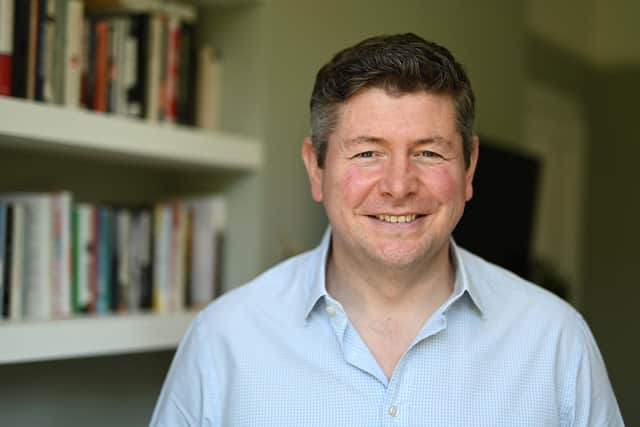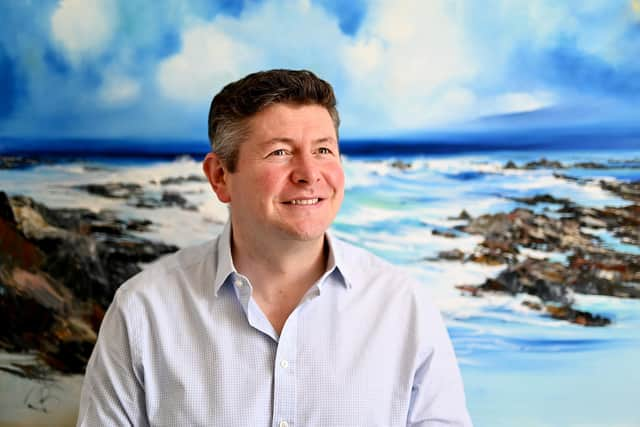The Big Interview: Jamie Livingston, CEO and chairman, Livingston James Group
Covid-19 has turned the world on its head with home working, Zoom calls and virtual meetings becoming the norm.
Jamie Livingston, chief executive and chairman of Scottish executive search business Livingston James Group, reflects on the past 15 months and provides an insight into how technology and shifting social expectations are changing the face of the industry.
Advertisement
Hide AdAdvertisement
Hide AdIn 2019 you bought out your partner to become CEO. What prompted this move and how has the company progressed since then – for example you’ve implemented a "purpose-led" approach?


Andy and I were a good team and had great fun building the business in the early years. As we grew and matured as an organisation, it became apparent that it would be better for the business if one of us was able to set clear direction and make the final call on tough decisions.
Given a number of factors, both in and out of work, we decided the best solution was a structured and amicable buy-out – which I led. Andy remains on our board as a non-exec and great friend.
Concurrent with the buy-out we were running an internal process to define our purpose. I was eager that we all had a say in and understanding of why we were doing what we were doing and wanted to identify a ‘North Star’ that could guide us regardless of changes to the market and set a course for our evolution as a business.
The result of the process being, we are here to advise and support people and organisations to realise their potential so that together we can impact lives and communities for the better.


Our purpose now sets direction for all that we do from strategic decision making and new service/market opportunities through to how we seek feedback from clients and candidates on a daily basis.
In addition, at the end of 2019 we had the thoroughly well-deserved promotion of Mark Lewis to the main board, and signed off on a redefined strategy for the next five years.
The business turned ten in January 2020 and we had a series of events planned throughout the year.
Then Covid struck.


Advertisement
Hide AdAdvertisement
Hide AdConsequently, how have you and the business adapted to the pandemic?
I think we have adapted really well, principally for two reasons.
Firstly, crystal clarity on our purpose (just in the nick of time as it turned out). This meant that once we had our colleagues safe and set up from home, we knew that people and organisations were still going to be striving to realise their potential, even if that might have meant a focus on survival in the short term, and that we could still impact lives and communities for the better.
Clients might not have been recruiting, but by focusing on our purpose and values we set about organising focus groups for leaders to share best practice on response to the virus.


We got on to candidate events focused on career development and virtual interview techniques very quickly. “e kept on raising awareness and funds for our community partners, and we set up internal champion groups around wellness, volunteering, fundraising and social activities.
In doing so, we kept our levels of external and internal communication extremely high even when short-term demand for our services plummeted. Consequently, as demand returned, we were in really good shape to respond.
Secondly, our people were and remain absolutely amazing. The resilience and work ethic of the team were faultless and their innovation and adaption through the teeth of the crisis were an inspiration to me. I feel very blessed to have been in the trenches with this group of people through these times.
Clarity of purpose and great people led to record levels of productivity through the second half of last year and have set a platform for what has the potential to be a record-breaking 2021.
Advertisement
Hide AdAdvertisement
Hide AdHow are the firms you work with also adjusting and what approach are they taking to how their staff work in a post-lockdown world?
We are fortunate to work with some great clients across a broad range of sectors and geographies, so there is appropriate variety of response and plans for post-lockdown work.
Key themes being explored at the moment are around flexibility and innovative use of space moving forward, but I don’t think too many people are confident they have a definitive answer to the future work of work just yet.
The small number of organisations who have made bold commitments to the extreme of either five days back in the office or no offices moving forward might end up revising those decisions over time.
Livingston James has said technology can "bring people closer together and divide in almost equal measure" – how can tech be harnessed for "good", but also how crucial is the “human touch” in the sector?
Tech can be harnessed for good in so many ways.
If we look at how crucial technology like Microsoft Teams and Zoom have been through the pandemic, we can see how organisations have been able to ‘remain together’ and function without physical proximity.
Looking to sectors like med-tech we can see technologies emerging that will extend and enhance the quality of life of our ageing population and advances of technology in the renewables space are making a huge difference to the climate change agenda – so there is no doubt that the tech sector in its broadest sense can and does have a hugely positive influence.
What is also important to be aware of is that part of the human experience is being, not just having, a body and as we communicate ever more efficiently through remote means, the lack of physical proximity; that hug, that pat on the back, high five or handshake starts to take a toll. I do think that part of the developing mental health crisis is being caused by a simple lack of ‘human touch’ in a very literal sense.
Advertisement
Hide AdAdvertisement
Hide AdIn addition, particularly when we come to the use of AI and areas of defence-related technology, we need to make sure that human ethics rather than efficiency are driving the agenda – science fiction has painted some pretty scary visions of what could go wrong if we don’t.
Livingston James recently teamed up with Brodies LLP to host a virtual event looking at the current process of bringing international talent into the UK. Can you give more details on this, against the backdrop of Brexit?
I will leave comment on the legal and political aspects to the experts, but it is certainly the case that we are seeing acute talent shortages in particular areas of the market and it is far harder to bring in overseas talent than it was in the past.
Redeployment of UK workers from other sectors is easy to say in theory, but I am not sure it is very realistic, particularly in highly skilled areas such as technology and financial services.
You’ve said people "seem to be seeking work that matters”. To what extent have developments in society – for example tackling racial injustice, the emergence and growth of the #metoo movement, and the many cases that have come to light about unacceptable behaviour by people in power – altered what people now look for and expect from an employer?
There are certainly connections between the two elements of your question, but I will address them from two different perspectives as I think the first is related to what an organisation / job role does and the second is related to how it is done.
I think that for many, the period of lockdown has afforded significant time for reflection and be it the tragic evidence of our mortality playing out on the news daily or the incredible bravery and celebration of our NHS, people have been questioning what is important to them and how they want to spend their lives.
Volunteering numbers are through the roof, we are seeing significant interest in third-sector roles from the private sector, and candidates are interrogating the social and environment credentials of potential private sector employers before even applying.
Advertisement
Hide AdAdvertisement
Hide AdThe question historically has been ‘do you want to make a difference or make money?’. I wonder if a better solution might be finding a way to put an ‘and’ in place of the ‘or’ in the question, to which I suspect the answer would be an easy yes for most people.
To address the second element, I think that there has been huge positive progress in the culture of many organisations as a consequence of society really taking on racial injustice and the emergence of movements such as #MeToo.
There is a lot of work still to do, but candidates are voting with their feet and will not tolerate inappropriate behaviour in the companies they work for – the emerging skills shortage will give the employee even more power to effect change.
Transparency of platforms such as glassdoor.co.uk and social media in general mean that businesses can no longer sweep things under the carpet. Organisations, and their leaders in particular, need to walk their talk when it comes to equality and social justice.
Who do you admire in business?
One of the great perks of my job is that I get to meet and learn from so many fantastic leaders and I have been inspired many of them over the years.
A standout for me at the moment is Bob Chapman, CEO of Barry-Wehmiller. What he has manged to achieve with an incredibly people-centric approach to business is truly inspiring.
You said in 2019 that looking to the next ten years, "I see huge opportunity for the organisation to build on the firm foundations we have set". What would you like the group to look like in 2029, for example do you foresee any M&A activity?
By 2029 I want us to be the go-to organisation for people and organisations in Scotland who are looking to realise their potential and make a positive impact in the world, both as an employer and service provider.
Advertisement
Hide AdAdvertisement
Hide AdTo achieve this, I see us developing new services that align with our purpose and following our clients with regards geographic expansion.
At the moment, along with refining our core business, this sees us exploring partnership with strategy consultancies and organisations that focus on executive development and human potential – if there is mutual benefit this could lead to M&A in the future.
We are also doing a lot of work with PE firms in London and in the renewables space in Aberdeen, so I can see client led expansion into those geographies.
Of course, doing any of this is only possible if we have great people who are personally committed to living our purpose, not only in service of our clients, candidates, and communities, but also for themselves – so I see us continuing to invest heavily in the growth and development of our own people as the key priority.
Comments
Want to join the conversation? Please or to comment on this article.